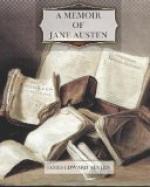This was the small circle, continually enlarged, however, by the increasing families of four of her brothers, within which Jane Austen found her wholesome pleasures, duties, and interests, and beyond which she went very little into society during the last ten years of her life. There was so much that was agreeable and attractive in this family party that its members may be excused if they were inclined to live somewhat too exclusively within it. They might see in each other much to love and esteem, and something to admire. The family talk had abundance of spirit and vivacity, and was never troubled by disagreements even in little matters, for it was not their habit to dispute or argue with each other: above all, there was strong family affection and firm union, never to be broken but by death. It cannot be doubted that all this had its influence on the author in the construction of her stories, in which a family party usually supplies the narrow stage, while the interest is made to revolve round a few actors.
It will be seen also that though her circle of society was small, yet she found in her neighbourhood persons of good taste and cultivated minds. Her acquaintance, in fact, constituted the very class from which she took her imaginary characters, ranging from the member of parliament, or large landed proprietor, to the young curate or younger midshipman of equally good family; and I think that the influence of these early associations may be traced in her writings, especially in two particulars. First, that she is entirely free from the vulgarity, which is so offensive in some novels, of dwelling on the outward appendages of wealth or rank, as if they were things to which the writer was unaccustomed; and, secondly, that she




